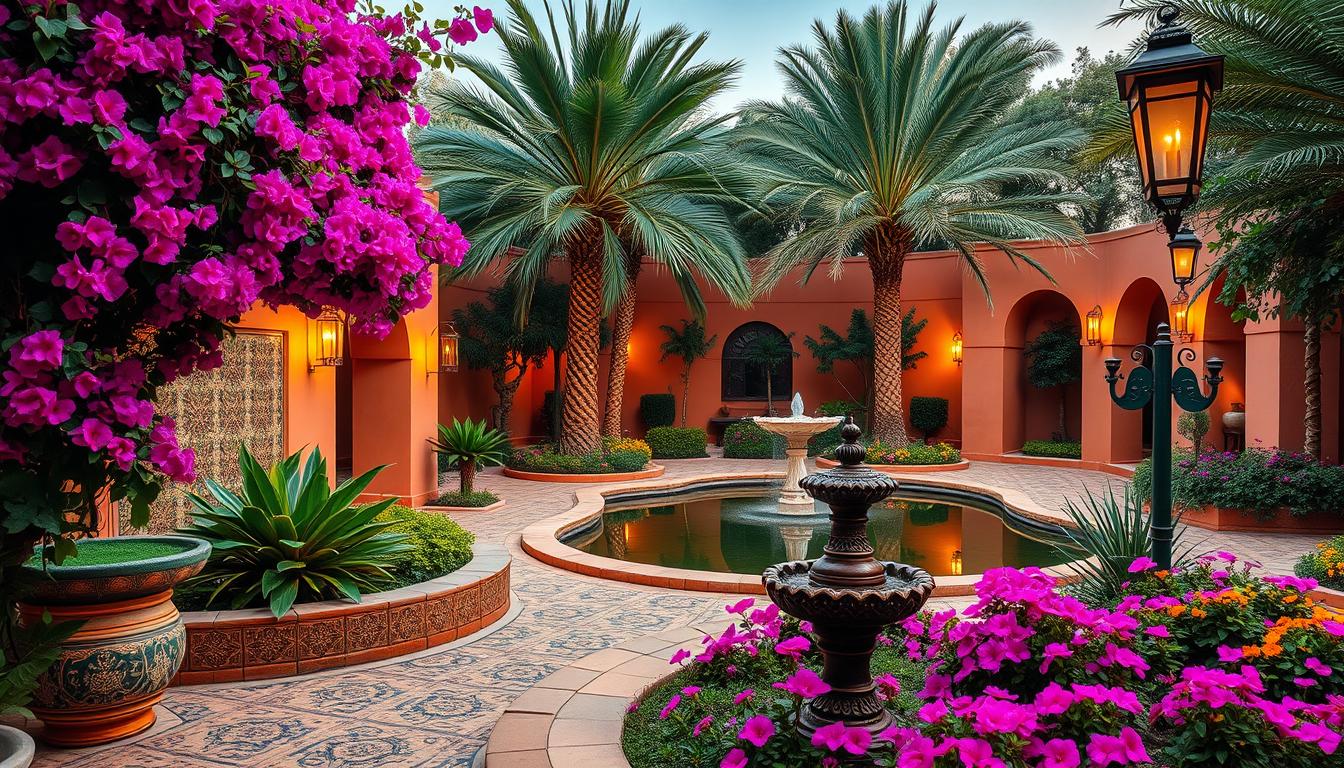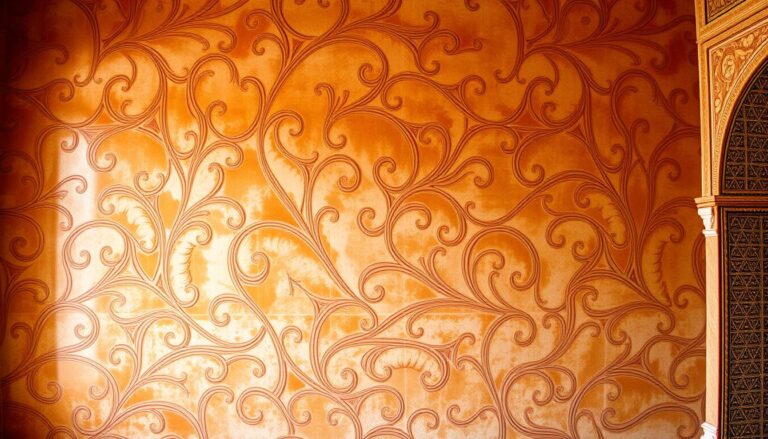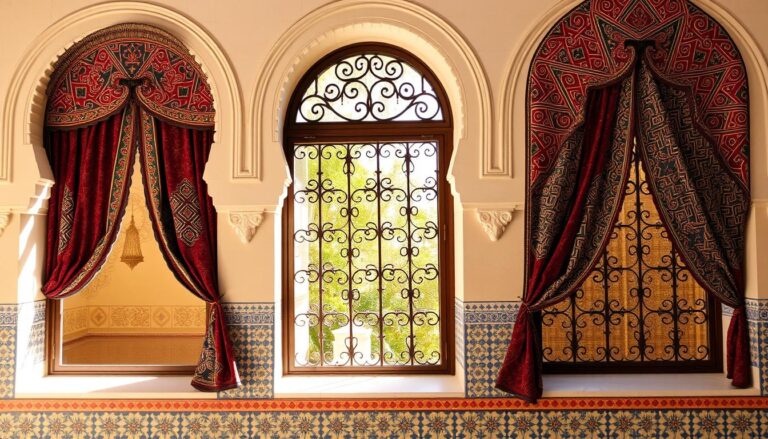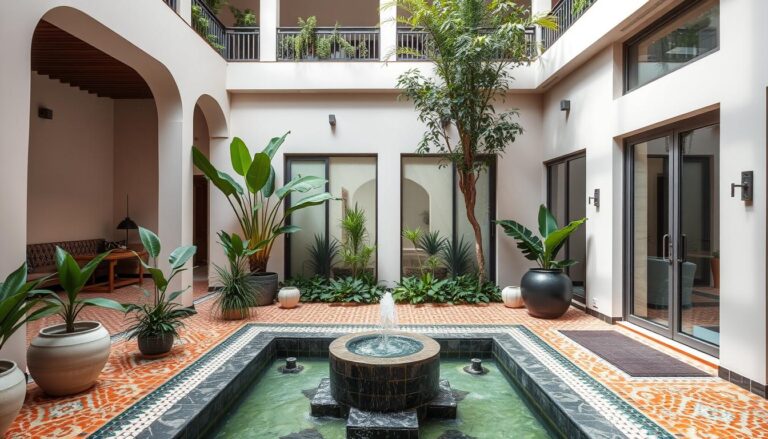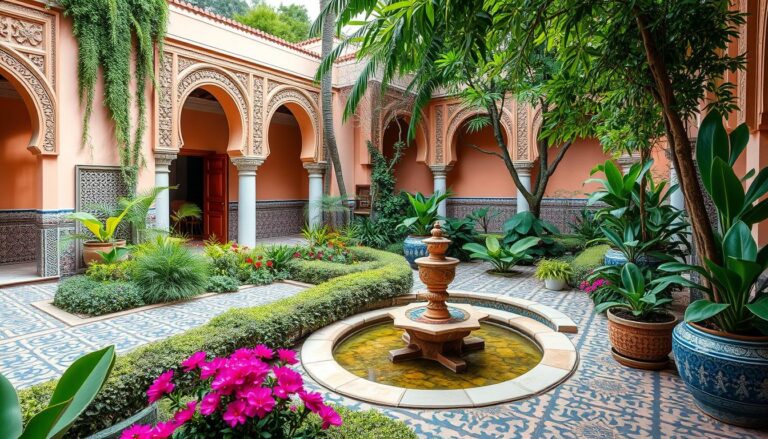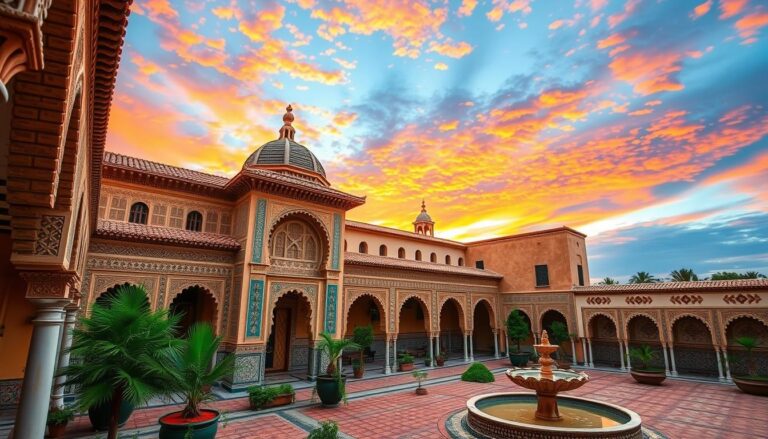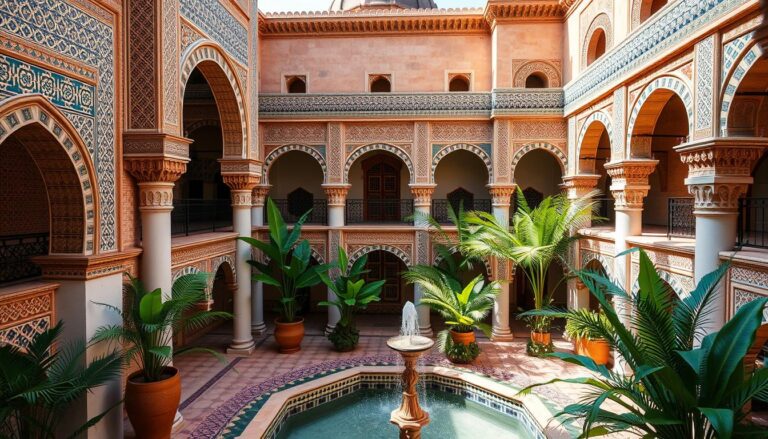Have you ever wondered how Moroccan garden design has become a global trend? It has inspired people everywhere to make their outdoor spaces magical. This design, famous in Marrakech, brings together bright colors, detailed patterns, and calm water features. It mixes old Islamic styles with new ideas.
Key Takeaways
- Moroccan garden design has captivated the world, blending traditional Islamic influences with modern interpretations.
- Moroccan gardens feature a unique fusion of vibrant colors, intricate patterns, and serene water features.
- Moroccan garden design transcends geographical boundaries, inspiring homeowners and designers globally.
- Moroccan gardens showcase a diverse range of drought-tolerant and heat-loving plants, emphasizing the importance of resilient flora in garden design.
- Specific Moroccan garden design elements, such as birdcages, lanterns, and striped fabrics, are commonly used to create a cohesive and authentic aesthetic.
Moroccan Garden Design: A Timeless Tradition
Moroccan garden design is a mix of Islamic and Moorish styles. It creates a unique and beautiful look. At its core are the detailed Islamic garden patterns and the fancy Moorish architecture. These blend nature and man-made spaces perfectly.
The gardens in Morocco are famous for their Zellige tilework and geometric mosaics. These designs cover the paths, fountains, and buildings. They remind us of the patterns in famous Moorish places, like the Alhambra Palace in Spain.
Islamic Garden Patterns and Moorish Architecture
The Majorelle Garden in Marrakesh, Morocco, shows this tradition well. It was started by French painter Jacques Majorelle in the 1920s and 1930s. The garden mixes Moorish and Art Deco styles with Majorelle’s own touch. It has Moorish fountains, detailed tile work, and colorful archways, all in Majorelle’s “Majorelle Blue” color.
Moroccan pottery also shows this rich culture. These colorful, detailed ceramics often take inspiration from Moroccan architecture and gardens. They feature geometric patterns and natural motifs.
“The Majorelle Garden reflects the timeless principles of Islamic garden design, emphasizing symmetry, geometric patterns, and serenity.”
Moroccan garden design takes us to a world of beauty and peace. It’s all about the Islamic garden patterns and the fancy Moorish architecture. This tradition keeps inspiring and amazing people all over the world.
Marrakech: The Heart of Moroccan Garden Design
Marrakech, known as the “red city” of Morocco, is a hub for garden design. It boasts the famous Majorelle Gardens, a green paradise by French artist Jacques Majorelle and restored by Abderrazak Benchaabane. Benchaabane, an ethnobotanist and professor, also founded the Jardins du Maroc Magazine and the Festival Jardin’Art. These initiatives aim to celebrate and protect Morocco’s garden heritage.
The Majorelle Gardens are famous for their vibrant colors and unique design. They mix Art Deco with Moorish styles. The garden has two main parts: a traditional Islamic garden and an exotic section with many plant species.
Le Jardin Secret is another gem in Marrakech. It has been updated to show a traditional Islamic garden and an exotic area. Visitors can enjoy views from a tower.
Anima Garden is a 5-acre oasis with giant sculptures by artists like Picasso. It offers a free shuttle service, making it easy to visit.
Marrakech’s gardens, thanks to Abderrazak Benchaabane, are a key part of Moroccan garden design. They draw visitors worldwide with their mix of traditional and exotic elements.
Moroccan Garden Design Worldwide
Moroccan garden design has won hearts globally. It’s not just about Riads in Marrakech anymore. Now, it’s about bringing that magic to homes everywhere. People love the beauty of Moroccan gardens, with their water features and fragrant plants.
Designers mix old Moroccan styles with new materials and plants. This creates gardens that feel like a dream. Lemon and orange trees add to the charm, giving fresh fruits too.
Moroccan decor is all about mixing textures. You’ll find sleek ceramics, soft cushions, and carved wood. Lanterns and string lights add a warm glow, making the space feel mystical.
Pergolas are key in Moroccan gardens. They offer shade and privacy. Adding curtains or vines makes them cozy. The colors and patterns create a lively, exotic feel.
Moroccan garden design has reached places like California and Europe. It’s changing outdoor spaces everywhere. It brings a piece of the Mediterranean to our backyards.
Contemporary Interpretations and Fusion Styles
Moroccan garden design has won hearts around the world. Designers have taken on the challenge of updating traditional elements for today’s tastes. They mix old patterns, materials, and designs with new looks and uses. This creates gardens that are both modern and full of Moroccan charm.
These spaces feature zellige tilework, geometric mosaics, and peaceful water features. But they also have sleek lines and new materials. This makes them appealing to today’s audience.
Blending Traditional and Modern Elements
Contemporary Moroccan garden design is all about finding a balance. Designers mix old Moroccan styles with today’s tastes. This creates spaces that are both beautiful and functional.
From zellige tilework on fountains and paths to geometric mosaics on walls and floors, these gardens are a mix of old and new. They show how timeless designs can meet modern needs.
- Incorporation of natural materials like terracotta, cedar, and wrought iron to maintain a connection to Moroccan heritage
- Use of a vibrant color palette, including blues, reds, oranges, and metallic accents, to evoke the warmth and energy of Moroccan design
- Seamless integration of water features, such as serene pools and cascading fountains, to create a sense of tranquility and respite
- Innovative use of modern materials and technology to enhance functionality and sustainability without compromising the traditional essence
“These fusion-inspired gardens are a testament to the enduring appeal of Moroccan design and the ingenuity of contemporary creatives. They invite us to step into a world where the past and present coexist in perfect harmony.”
The Allure of Moroccan Riad Courtyards
Moroccan garden design shines in the courtyards of traditional Riads in Marrakech. These Moroccan Riad courtyards are peaceful oases. They are hidden behind simple facades, connecting us deeply with nature.
Aromatic plants and water features make these spaces magical. The Zellige tilework and geometric mosaics on walls and floors add to their beauty. They show Morocco’s rich culture and history.
“The Moroccan Riad courtyards offer a serene escape, a chance to immerse oneself in the essence of Moroccan garden design.”
More than 90% of Moroccan riads have a central courtyard. These spaces are the heart of the home. Guests find 5 to 10 rooms, with 80% offering traditional Moroccan food.
The beauty of Moroccan Riad courtyards goes beyond looks. They reveal Morocco’s long history in gardening and architecture. With almost all riads having rooftop terraces and 70% offering cultural activities, they offer a unique experience.
The Moroccan Riad courtyards captivate with their calm, design, and cultural connection. They inspire and enchant visitors from everywhere.
Conclusion
Moroccan garden design has won hearts around the world. It has inspired people to make their outdoor spaces magical. From Marrakech to other places, this design mixes old Islamic and Moorish styles with new ideas.
This blend brings together bright colors, detailed patterns, and peaceful water features. The love for Moroccan design keeps growing. It’s changing outdoor spaces everywhere, adding beauty and culture.
Moroccan garden design is more than just a trend. It’s a way to celebrate Morocco’s rich history. It includes Mediterranean landscaping, Islamic patterns, and Moorish architecture.
It also features Zellige tilework, Riad courtyards, and water features. Aromatic plants, geometric mosaics, and outdoor living spaces add to its charm.
The beauty of Moroccan garden design shows how culture can unite us. It reminds us of the endless creativity and timeless beauty found in Morocco’s gardens.
Source Links
- Moroccan Style Garden: How To Design A Moroccan Garden
- Moroccan garden ideas — 7 designer-approved ways to add vibrancy and warmth to your space
- Moroccan Design – Global Inspirations Design
- Aesthetic Inspiration and Design Lessons from the Majorelle Garden In Morocco
- The Timeless Beauty of Moroccan Pottery in Gardens
- Gardens of Marrakesh, Morocco – Self-Guided Day Trip
- Le Jardin Secret: an Islamic garden in the heart of Marrakech
- 5 Moroccan Garden Ideas To Bring Vibrancy and Warmth
- How to Design a Moroccan Style Outdoor – Latitude 31n
- Eric Ossart and Arnaud Maurières’ design in the Atlas Mountains
- What is Moroccan Interior Design? – HGTV
- Moroccan Zellige Mosaic Tiles with a Modern Twist! – 15 Pattern Ideas – MEC – Bespoke Luxury Mosaics
- Moroccan Fashion: A Timeless Blend of Tradition and Modern
- Exploring the Essence: What is a Moroccan Riad? – Riad Hikaya
- Unveiling the Intriguing Beauty of Moroccan Garden Design
- Unveiling the Captivating Beauty of Moroccan Gardens
- The Cultural Landscape Foundation’s Morocco Adventure

The Editorial Team is a passionate group of Morocco enthusiasts dedicated to sharing the beauty, culture, and wonders of this captivating country. With diverse backgrounds and a deep love for travel, we strive to bring you engaging and informative content that inspires your Moroccan adventures. From uncovering hidden gems and sharing local insights to exploring mouthwatering cuisine and showcasing the vibrant lifestyle, our team is committed to providing you with valuable resources and exciting stories that enhance your exploration of Morocco. Join us on this journey as we celebrate the rich heritage and unforgettable experiences that make Morocco truly special.

